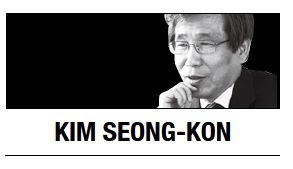
There is a Korean saying: “To find water, concentrate on digging one well at a time.” It means we need to become professionals and specialists, not shallow amateurs.
But times have changed. These days, we need people who can dig as many wells as possible in order to benefit many people. Indeed, the present age calls for open-minded men who have a global perspective rather than parochial views, and erudite men who have wide perception rather than men of narrow specialties.
We need Renaissance men like Leonardo Da Vinci who was skilled in a wide range of fields. As is well known, Da Vinci was not only a writer, painter, sculptor, but also an architect, inventor, and scientist.
If we became Renaissance men, we would be open to hybrid cultures and convergence between science and the humanities. We would not be scared of the advent of the age of artificial intelligence or the age of pop culture. Today both AI and pop culture have become part of our daily lives.
As Renaissance men, we also would not be afraid or embarrassed when confronted with the unknown or different. As a jack-of-all-trades, a Renaissance man would be skilled in many fields and be capable of embracing differences.
Recently in his lecture at Sangmyung University, prominent critic and novelist Lee O-young asserted that we did not need to make a fuss over AlphaGo’s victory over the Korean Go Master Lee Se-dol in a recent match. According to Lee, AI is already ubiquitous and permeates our everyday lives.
“Smartphones and computers already have AI,” he said. Adding that since AI could outsmart human beings, if misused it could turn into a nightmarish monster. At the same time, however, he went on to argue that if we changed artificial intelligence into artificial wisdom, it could be a boon instead of a threat.
I think Lee is a Renaissance man who has the capacity of applying his knowledge of the humanities in science.
In the near future, perhaps, we will be living with flesh-and-blood androids with AI. Spielberg’s film “AI” depicts a futuristic society where humans and AI robots coexist. Hollywood movies such as “Matrix,” “Stealth,” “Surrogate,” and “Oblivion” have warned us of the possibility of AI taking over control from humans. However, sci-fi movies such as “Bicentennial Man” envision the possibility of reconciliation between man and robots. In fact, it is the job of scholars of the humanities to warn us of the misuse of technology and explore the possibility of peaceful coexistence of AI and human beings. It is also their job to foster Renaissance men who are not blindly opposed to AI but can embrace both man and machine.
Renaissance men can come up with answers to seemingly uncontrollable crisis. Where ordinary men despair, Renaissance men thrive.
Edgar Allan Poe’s “Three Sundays in a Week” well illustrates this point. At first, the story may sound silly, and yet it presents a brilliant young woman who can conjure up a solution to a problem that is seemingly impossible to solve.
In the story, Bobby and Kate want to get married. The problem is how to persuade Bobby’s obstinate, rich granduncle and legal guardian Rumgudgeon who is opposed to their wedding. Rumgudgeon presents one condition, joking, “If only you find three Sundays in a week, I will grant the wedding.”
Although it seems an impossible task, Kate does not despair and comes up with a solution. She invites two of her Navy captain friends to Bobby’s house for a chat on Sunday afternoon. Capt. Pratt has just returned from his voyage to the East, and Capt. Smitherton has come back from the West, both crossing the date line in the opposite direction. While chatting, Kate deliberately invites the two captains to dinner the next day, Capt. Pratt replies, “My dear fellow, you forget tomorrow will be Sunday.” To him, Kate answers, “Oh, no. Today is Sunday.” Then Capt. Smitherton interferes, “You are all mad, every one of you. I am as positive that yesterday was Sunday as I am that I sit upon this chair.” At the very moment, Kate tells Rumgudgeon, “The fact is, we are all right, and thus three Sundays have come together in a week.” The problem is solved and Rumgudgeon has no choice but to give his permission for their wedding.
In this age of artificial intelligence and virtual reality, we need people like Kate who can skillfully cope with crises and find a way out even when stuck in a cul-de-sac.
Instead of narrow-minded people who pontificate outdated ideas about pure literature and highbrow culture, we need open-minded people who can adapt to popular literature and middlebrow culture. Rather than those who build wall between science and the humanities, we need people who can consolidate technology and literature. This age calls for Renaissance men and women.
By Kim Seong-kon
Kim Seong-kon is a professor emeritus of English at Seoul National University and president of the Literature Translation Institute of Korea. -- Ed








![[Weekender] Korea's traditional sauce culture gains global recognition](http://res.heraldm.com/phpwas/restmb_idxmake.php?idx=644&simg=/content/image/2024/11/21/20241121050153_0.jpg)